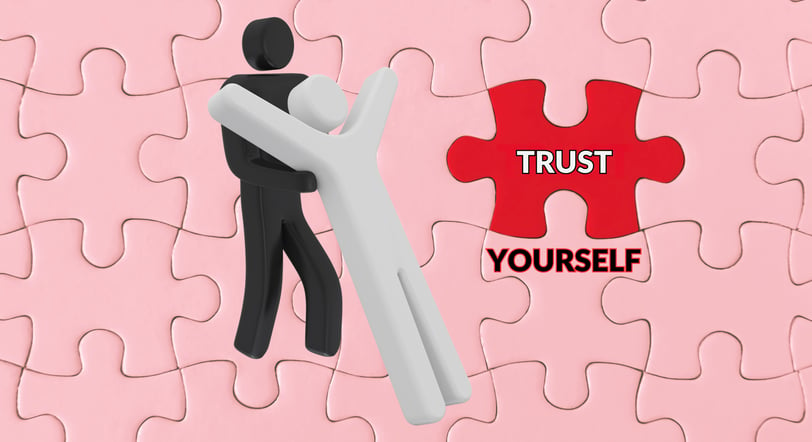5 Steps to Rebuilding Trust in Yourself and Others After Narcissistic Abuse
Rebuilding trust after narcissistic abuse isn’t easy, but it is possible. Take back control and learn how to rebuild trust in yourself and others with these 5 steps. Here’s how you can start trusting again, one step at a time.
RELATIONSHIPSTRAUMA & ABUSE
Tyrone
12/20/20244 min read


Confronting the Aftermath: Rebuilding Trust in Yourself After Narcissistic Abuse
After leaving a narcissistically abusive relationship, rebuilding trust in yourself can feel like an uphill battle. For many, the social connections that once provided comfort may have faded, leaving you feeling alone—or maybe even lonely. Personally, I didn’t struggle with loneliness, as I’m someone who values and enjoys solitude. But what hit me hard was the realization that I no longer trusted my own intuition.
Years of gaslighting had chipped away at my confidence in what I knew to be true. Even though there were moments when my gut feelings were spot on and should have taught me to trust myself, there were just as many—if not more—moments where I was left doubting everything. I spent so much time trying to reconcile words with actions, focusing on what my partner said and how she expressed her feelings, that I missed the glaring inconsistencies in how she actually behaved.
When the relationship ended, I found myself carrying a deep fear—not just of connecting with others but of even mentioning what I had gone through. Talking about it reminded me of the pain, of how someone I chose to love had wreaked havoc on my life in ways I was too naive to see. And yet, living with the aftermath felt almost as unbearable as living with her.
It was in those moments of self-reflection that I realized the harsh truth: I hadn’t just been let down by her—I had let myself down, too. By failing to take care of myself, by ignoring my own needs, and by allowing someone else’s chaos to overshadow my peace, I had betrayed my own well-being.
Learning To Trust in Yourself
One of the hardest parts of trauma recovery is learning how to trust yourself again and rebuilding your ability to trust others. But here's the good news: Trust is something you can rebuild. It takes time, effort, and a lot of patience, but it’s absolutely possible. Here are the 5 key steps that I took on my journey. Maybe they are the steps that you can take to start rebuilding trust in yourself and in the people around you.
1. Start with Self-Compassion: Be Gentle with Yourself
After trauma, it’s easy to blame yourself for what happened, especially if the situation left you feeling betrayed. You might think, “How could I not have seen the signs?” or “Why did I allow this to happen?” These feelings are common but not helpful. To rebuild trust, you first need to show yourself compassion. Remember, trauma isn’t your fault, and you did the best you could at the time.
Action Step: Start by practicing self-kindness. When negative thoughts arise, replace them with positive affirmations like, “I am healing,” or “I am worthy of trust.” Treat yourself the way you would treat a close friend who's going through something similar.
2. Take Small Steps to Rebuild Trust in Yourself
Trusting yourself again after trauma means learning to listen to your instincts. After a betrayal, it can feel like your intuition has been shattered. But the more you practice tuning into how you feel and what your gut is telling you, the stronger your self-trust will become.
Action Step: Start with small decisions. Practice trusting yourself in everyday choices, like what to eat, what to wear, or how to spend your time. Each small act of trust helps build your confidence in your own judgment.
3. Set Healthy Boundaries with Others
After being hurt by someone you trusted, it can feel impossible to open up again. To rebuild trust in others, you first need to protect yourself. Setting clear, healthy boundaries allows you to feel safe while still allowing room for positive, trustworthy relationships to grow.
Action Step: Practice saying “no” when something doesn’t feel right. Communicate your needs clearly to others, and don’t be afraid to distance yourself from people who don’t respect your boundaries. The right people will respect and support your limits.
4. Forgiveness: Not for Them, But for You
Forgiveness doesn’t mean you have to forget or excuse what happened. Instead, it’s about freeing yourself from the anger, resentment, or pain that holds you back. By forgiving, you take back your power and begin the process of letting go of past hurt, allowing yourself to move forward.
Action Step: Start with forgiving yourself. Write down what you're forgiving yourself for and how you plan to let go of any guilt or shame. Then, consider whether you're ready to forgive others. Forgiveness is a personal journey and doesn’t have to be rushed.
5. Take Your Time: Trust Takes Time to Build
It’s important to understand that rebuilding trust is a process, not a race. Don’t rush yourself, and don’t feel pressured to trust again immediately. Take the time you need to heal and rebuild at your own pace.
Action Step: Give yourself permission to take things slow. Whether you’re rebuilding trust in yourself or in others, don’t feel like you need to “get over it” by a certain time. Trust will rebuild gradually, and that’s okay.
Final Thoughts
Rebuilding trust after trauma is challenging, but it’s one of the most important steps you can take in your healing journey. By starting with self-compassion, making small decisions, setting boundaries, practicing forgiveness, and being patient with yourself, you can rebuild trust—first in yourself and then in others. Remember, it’s okay to take things one step at a time.
You are worth the effort it takes to heal, and you deserve to trust again.

